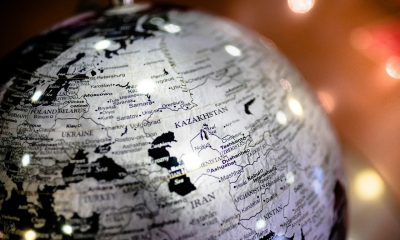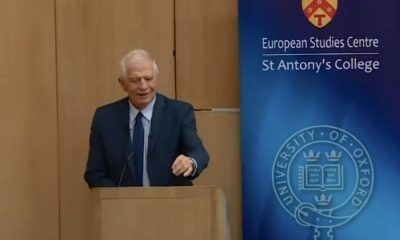Polaitíocht
An tseachtain seo chugainn: Athraithe, athraithe go hiomlán

It has been a historic few days with many firsts, principally the EU’s decision to use its “peace facility” and EU inter-governmental funds, which strictly speaking are outside the main EU budget, to send lethal weapons to Ukraine. To borrow from Borrell, we have to be able to defend the peace. As this mail will reach you, ceasefire talks have started near the Belarus border.
The other truly remarkable decision - among others - was the decision of Germany to perform a complete volte-face on their defence policy and accompanying spending with Chancellor Scholz committing to €100 billion in defence spending meeting the NATO commitment of 2% GDP. This is, in objective terms, what you’d call HUGE! Putin has succeeded where others have failed.
Does this mean that Schwarze Null is dead? Well not quite, this spending will be through a special fund. The EU is dabbling with the idea of a sort of Grüne Null, where green deal spending can maybe be overlooked when applying the EU’s Stability and Growth Pact in future. Added to the very clear need to reduce Europe’s reliance on Russian gas, this spending may now be seen in an even more existential light.
At last week’s informal meeting of European Finance ministers cleared the agenda to discuss the implications of the Russian invasion of Ukraine and the impacts of sanctions and spending. Following the meeting French Finance Minister Bruno le Maire said: “Respect for our most fundamental European values has a price, we are prepared to pay that price.”
On Wednesday (2 March), Executive Vice President Dombrovskis is expected to present his 2023 Fiscal policy guidance and ‘A future-proof European Growth Model: towards a green, digital and resilient economy’. That word resilience has taken a whole new level of importance. Likewise, Executive Vice President for the European Green Deal Frans Timmermans is tabled to present a “Joint European Action for more affordable, secure and sustainable energy.”
Today (28 February) Defence ministers are meeting to discuss the provision of weapons to Ukraine. Foreign ministers and defence ministers are keeping a wary eye on where trouble could flare up in the EU’s near abroad: Georgia, Moldova and most worryingly of all in Bosnia i Herzegovina.
Transport, Telecommunications and Energy Council (Energy), (28 February): EU energy ministers will hold an extraordinary Council meeting to discuss the energy situation in Europe following the crisis in Ukraine.
Other Council meetings this week:
Informal Meeting of Ministers Responsible for Cohesion Policy (28 February - 1 March). The ministers responsible for cohesion policy will meet to discuss how to promote green, just and innovative policies at the regional level.
Justice and Home Affairs Council (3-4 March) is likely to be dominated by the influx of refugees from Ukraine. Ministers will build on discussions at yesterday’s emergency Council. Already tabled to discuss increased security at the Schengen area’s external borders, as well as migration and asylum rules within the EU, the debate will have a whole new importance.
Informal General Affairs Council (3-4 March): Ministers of European Affairs will meet in Arles to reflect a focus on the future of Europe, including the long-term goals of the EU to become a greener, more socially-aware and more digital society. The debate on the Future of Europe is likely to have a new resonance, with Europe’s security and defence autonomy given renewed vigour.
Parlaimint na hEorpa
This would usually be a committee week, but due to the exceptional situation an extraordinary plenary session has been organised for Tuesday (1 March).
Ukraine/Extraordinary plenary: The plenary will discuss with European Council President Michel, Commission President von der Leyen and EU foreign policy chief Borrell the EU’s responses to Russia’s aggression against Ukraine, including EU sanctions agreed at an extraordinary meeting of the European Council on 24 February. MEPs will vote on a resolution.
Ukraine/agriculture/trade: MEPs in the Agricultural and the International Trade committees will debate with the the impact of Russia’s invasion of Ukraine on the EU’s agricultural markets, the economy and trade (Monday).
Corporate sustainability: MEPs meet with Justice Commissioner Reynders on the Commission’s long-awaited proposal on corporate sustainability due diligence. Parliament adopted its own legislative initiative report on the topic in March 2021. The Commission’s proposal will require companies to introduce rules on due diligence, including identifying, mitigating and ending the adverse impact of their activities on human rights and the environment. (Monday)
Delegation to Latvia and Lithuania: A delegation of the Civil Liberties Committee visits Latvia and Lithuania to learn about the situation of those applying for international protection at the Belarus border. There will be a press conference on Thursday at 13.30 in Vilnius (local time, Lithuania). (Tuesday to Thursday).
International Women’s Day/Eurobarometer: The European Parliament will publish a Flash Eurobarometer survey for International Women’s Day. It focuses on the impact of government COVID-19 measures on the mental health and the financial and economic situation of European women, the increase in mental and physical violence against women, and what women want MEPs to do about it (Friday).
Comhroinn an t-alt seo:
-

 CoinbhleachtaíLá ó shin 3
CoinbhleachtaíLá ó shin 3Céimeanna an Chasacstáin i: Idirscaradh na hAirméine-Asarbaiseáin
-

 chasacstáinLá ó shin 5
chasacstáinLá ó shin 5Oibrithe Deonacha Aimsíonn Peitroglyphs ón gCré-umhaois sa Chasacstáin le linn Feachtais Timpeallachta
-

 An tAcht um Sheirbhísí DigiteachaLá ó shin 4
An tAcht um Sheirbhísí DigiteachaLá ó shin 4Beartaíonn an Coimisiún i gcoinne Meta maidir le sáruithe féideartha ar an Acht um Sheirbhísí Digiteacha
-

 MéadúLá ó shin 3
MéadúLá ó shin 3Cuimhníonn AE ar an dóchas a bhí ann 20 bliain ó shin, nuair a tháinig 10 dtír isteach





















